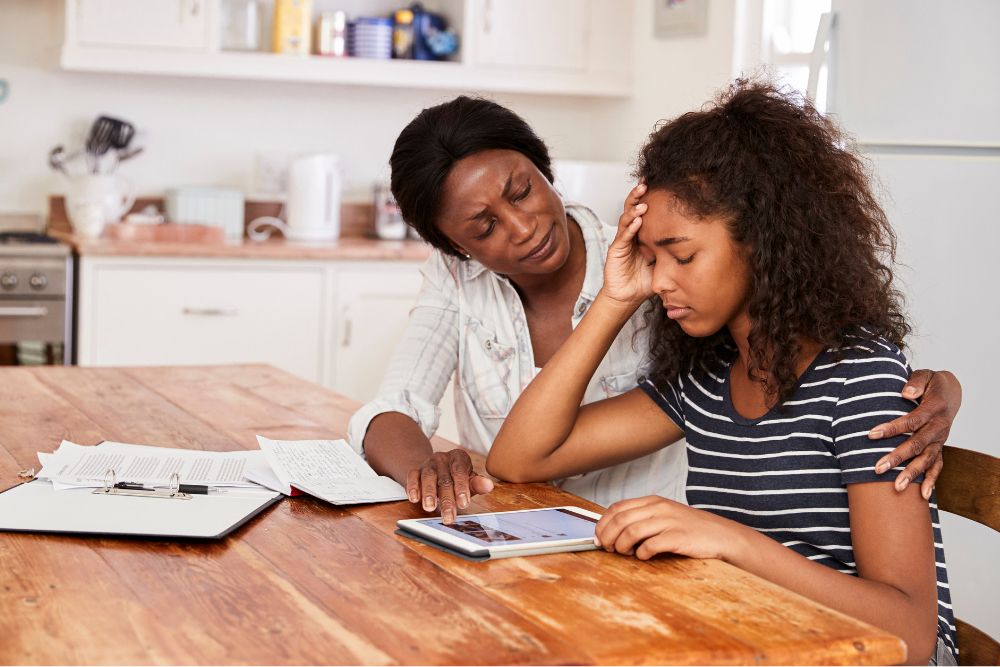Recognizing the symptoms of teen depression can be difficult. It’s estimated that 16% of children ages 12 to 17 will experience at least one episode of major depressive disorder, according to Mental Health America. If left untreated, teen depression can have a range of adverse mental and physical effects from interfering with their grades and ability to socialize to increasing their risk of suicide.
If your child may be struggling with depression, keep reading to learn the symptoms of teen depression to look out for. At Embrace U, we are a top-rated adolescent mental health care program in Brentwood committed to helping children and teens ages 10 to 18 receive the help they need to better manage symptoms of depression and other mental health conditions. We offer a parent education program so healing can continue at home. Ready to start your child’s recovery journey? Contact us today!
What is Teen Depression?
Depression is a mental illness that negatively impacts how a person feels, thinks, and interacts with the world. Teenagers experiencing depression often suffer from a persistent feeling of sadness and loss of interest in activities. Depression can lead to a variety of physical and emotional problems, decreasing a child’s ability to learn, maintain friendships, and lower their self-esteem.
Teen depression can’t be overcome with willpower. It should not be considered a phase, viewed as a weakness or personality flaw. Untreated depression in adolescents can have serious consequences. The good news is that for most teens, symptoms of depression can be managed with therapy and in some cases medication.
When to Seek Treatment for Teen Depression?
If you believe symptoms of depression are interfering with your child’s life, or have concerns about suicide or their safety it’s time to talk with a mental health professional who is trained to work with adolescents. Symptoms of depression usually don’t get better on their own. In most cases, teen depression will get worse if left untreated.
Treatment for teen depression ranges from individual therapy to intensive outpatient programs and residential programs. When considering treatment options it’s important to factor in the severity of symptoms, how long your child has experienced depression, and your treatment goals.
(EXTRA: Read more about the Mental Health Levels of Care and the differences between residential and outpatient programs.)

Common Signs of Teen Depression
Many teens experience depression; however, it can be difficult to distinguish if your child is having a bad day or actually struggling with symptoms of depression. Below are several common signs and symptoms of teen depression. Among the biggest signs to consider are significant changes in your child’s attitude and behavior, problems at school or home, and a lack of interest in things they once enjoyed.
- loss of interest in activities once enjoyed
- sudden changes in weight
- insomnia or sleeping too much
- persistent feelings of sadness or hopelessness
- angry outbursts, risky behavior
- isolating from friends and family
- self-harm
- abuse of drugs or alcohol
- lack of personal hygiene
- decreasing grades or work performance
Loss of Interest in Activities Once Enjoyed
If your teenager is no longer interested in or enjoying hobbies they used to love, this could be a sign they may be struggling with depression. While it’s normal for your teen to feel tired or stressed and skip out on doing a hobby, or even ask to stay home from school every now and then, giving up or avoiding things they once enjoyed is often a sign they are experiencing a mental health challenge.
Sudden Changes in Weight
Sudden appetite or weight changes may also be a symptom of teen depression. If you notice your teen gain or lose significant weight in a short period of time they may be struggling with depression. Some adolescents may experience a decreased appetite and lose significant weight, while others may overeat and use food as a coping mechanism to try and deal with their depression symptoms.
Insomnia or Sleeping Too Much
Changes in a teenager’s sleeping patterns are often a sign that they are struggling with depression. Lack of sleep or getting too much sleep can make symptoms of depression worse.
Persistent Feelings of Sadness/ Hopelessness
If you observe your teen being persistently sad or showing signs of worthlessness or hopelessness, this may also point to your teen struggling with depression. While it’s normal for teens to be moody and experience a sense of sadness on occasion, it’s not normal for them to feel sad for more than a week.
Angry Outbursts, Risky Behavior
If your teen routinely becomes enraged or starts partaking in risky behaviors this could be a sign they are struggling with depression.
Isolating From Friends and Family
Self-isolating from friends and family, such as staying in their room, or avoiding conversations, is another common sign of depression. This can be due to many reasons from not wanting to disappoint their loved ones to simply not having the energy to interact in social situations.
Self-Harm
If you notice any signs of self-harm, it’s critical your teen seek professional treatment for their depression. Self-harming or having suicidal thoughts are major signs your teen is struggling with severe depression or another mental health condition.
Abuse of Drugs or Alcohol
Sometimes teens will abuse drugs or alcohol in an attempt to mask and temporarily relieve their depression symptoms.
Lack of Personal Hygiene
Physical signs like a lack of personal hygiene, whether it be having a messy appearance or not seeming to shower or groom themselves consistently, are more symptoms of teen depression to look out for.
Decreasing Grades or Work Performance
If your child’s performance at work or school is suffering significantly, this may be yet another sign they may be struggling with depression. Often, teens with depression experience very low energy and thus may struggle to concentrate in school, thus resulting in lower grades.
How Can Parents Tell If Their Teenager is Depressed?
Distinguishing between the ups and downs of being a teenager and the symptoms of depression can be a challenge. Talk to your teen. Ask them open-ended questions such as:
- Is anything worrying you or making you scared?
- How is your body feeling?
- Do you know what’s bothering you?
- Who are your best friends? What do you do with them?
- What’s your favorite thing to do?
- What’s the biggest problem you’re facing?
- Would you like to talk to a mental health professional?
Ready to Start Your Recovery From Depression?
Parents should never feel too afraid or ashamed to ask for help in managing their child’s mental health symptoms. If you or someone you know is struggling with depression or another mental health disorder, it’s critical you seek professional help to better manage symptoms.
Embrace U, is a leading teen mental health treatment center that’s helped many adolescents safely and effectively manage their mental illness symptoms. With comprehensive treatment programs, a parent support group, and medication management, we help families reconnect and lead children to happier, healthier lives.
Contact us today to learn more about how we can help your child recover.




